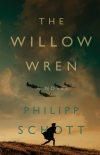The Willow Wren by Philipp Schott (electronic book reader TXT) 📗

- Author: Philipp Schott
Book online «The Willow Wren by Philipp Schott (electronic book reader TXT) 📗». Author Philipp Schott
Theodor paused and rubbed his forehead. “I know I slept most of the day, but I’m very tired again now. There’s not that much more to tell. I’ll finish tomorrow.”
The next morning, Theodor took up the remainder of the story. We assembled again in a semicircle around him. Even little three-year-old Oskar paid attention.
“So, the officers were gone, and we were under no obligation to fight anymore. It took only a fraction of a second to process this. Before his car was even out of sight, we all began throwing our Panzerfausts away — even the keenest among us — and we were all tearing the insignias off our uniforms. I doubt any of us really believed the Russians would be fooled, but we were going to do whatever we could not to be identified as soldiers. It was easy to outrun the tanks and we were soon in a kind of no man’s land further southwest along the border. It was here that we heard the war had ended. The 8th of May, which I suppose is a week and a day ago now. But the danger had not passed because we could still be captured by the Russians and executed or sent to labour camp in Siberia. We were by far not the only ones with the same idea. As we came down from the ridge and got onto larger roads, we found that they were full of German soldiers streaming west. The lucky ones had found civilian clothing, but most were like us, trying to disguise the fact that what we were wearing had once been a uniform.
“This large number of people fleeing also meant that food was impossible to find. We could tell where Russians had already been because the road would be lined with discarded vodka bottles, and we could tell where the Americans had been because the road was lined with their discarded ready-made breakfast packages. The vodka bottles didn’t interest us of course, but we examined each of these breakfast packages carefully, hoping that some scrap would remain, but there was never anything edible left.
“Things were getting quite desperate for food by the second day when one of the group of us walking together remembered that a secret military food storage depot was nearby. Predictably it had been mostly plundered, but we did find some food that we were able to put in a wheelbarrow. We did not get very far with that wheelbarrow. Almost immediately a German tank, also headed west, rolled up to us and an officer got out. He pointed his pistol at us and demanded all the food. At that point we decided that we would be better off splitting up. Most of us had different destinations in mind anyway. Fortunately I had memorized the Atlas of Saxony when I was younger, so I was able to mentally map out a route back to Colditz that I thought might avoid the Red Army.”
“The Atlas of Saxony!” I interjected. “I remember when we used to trace all the little roads and paths together like we were explorers!”
“Yes, I remember that too.” Theodor smiled at me. Then he continued his story. “I made my way to Schwarzenberg first where I was very lucky to find a family that offered to take me in for the night. They did not have much food, but they shared what they had with me, so I was no longer completely starved, and then the next day I began walking north towards Chemnitz, hoping that the Russians hadn’t gotten there yet. In fact it was in American hands, but a typhoid fever epidemic had broken out and the city was under complete quarantine, so I had to make a big detour around it. I slept in the woods, just south of Chemnitz and then again just north. This second time I was lucky again. A man saw me in the woods and offered to let me stay at his place where he had a little bit of food too. In other times this would have been frightening, going with a stranger, but I was desperate, and he was very kind. The war really sorts people into their true types, doesn’t it?
“Then one more thing happened, on the last day of my trek, so the day before yesterday. As I passed Burgstaedt, an American recognized that I was wearing a modified uniform and in German shouted ‘Halt!’ I panicked, not wanting to be captured so close to home, so I ran away across the field as fast as I could. He fired some shots at me but missed — obviously — and he made an attempt to run after me, but he gave up right away. I pushed through forty kilometres that day and night and arrived at the Mulde in the dark early morning. It was then that I figured out that although the Americans were on the west side where I was, the Russians were on the east where you were, and that the bridge was guarded. So, I took all my clothes off and made a bundle of them to put on my head and then I swam across. The guards





Comments (0)